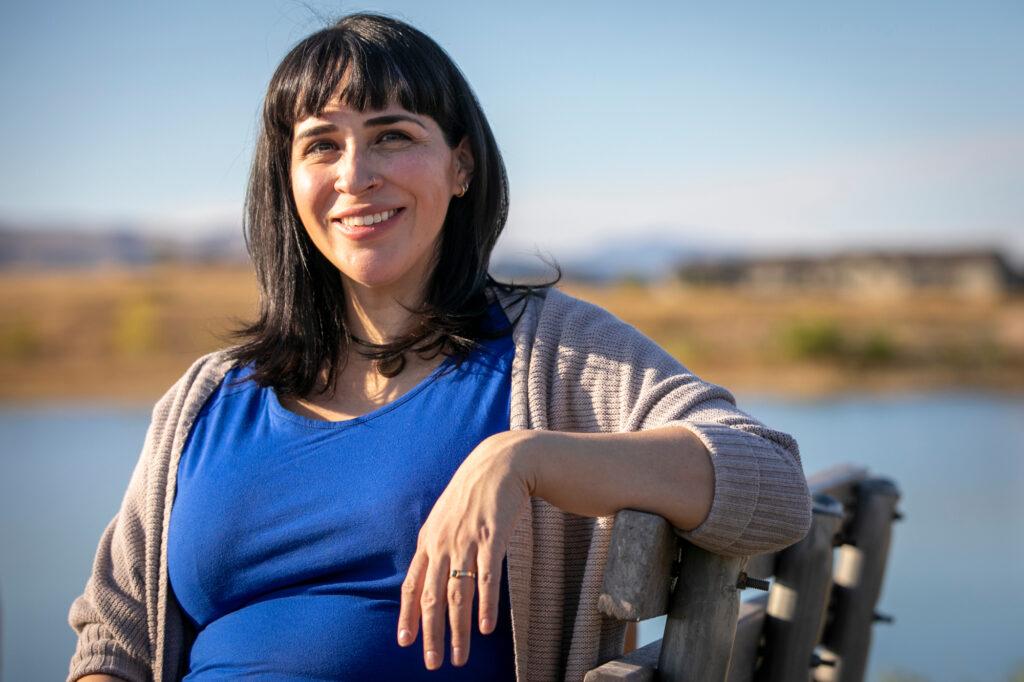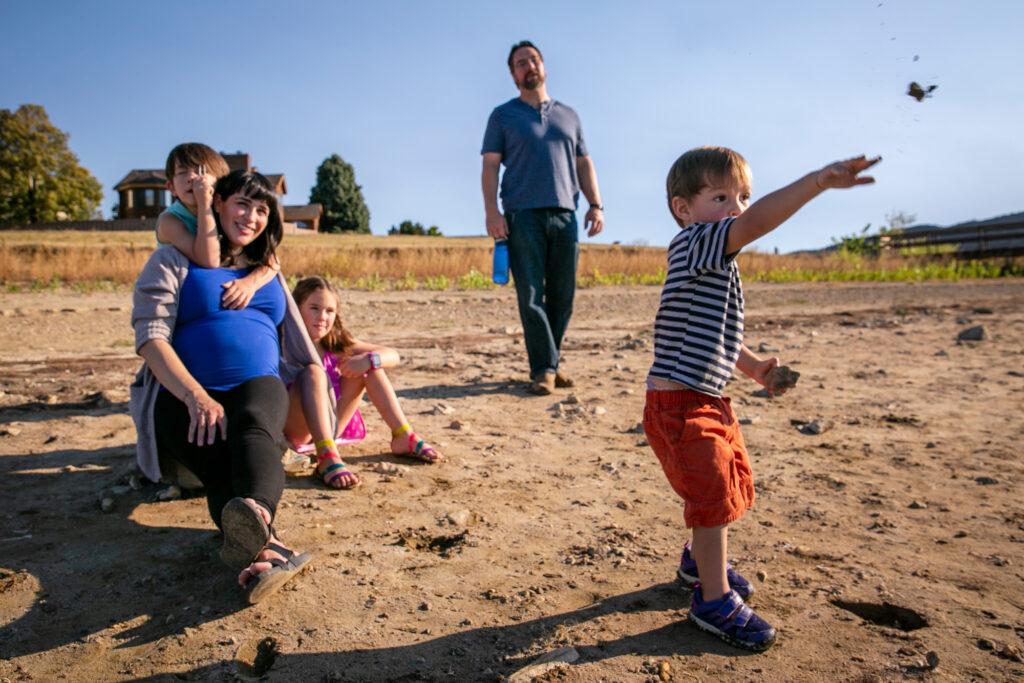
Updated Oct. 7 @ 12:24 p.m.
Christina Taylor was 20-weeks pregnant with her third child in May 2017 when she, her husband and two children excitedly went in for an ultrasound to check on development and to learn the sex.
“The ultrasound tech was looking at me, and she was pretty quiet,” Christina said. “I learned later that they can't give you a diagnosis. You have to wait for the doctor to look it over.”
Trying to entertain the two older children, her husband Roy had left to get them some lunch. When the technician returned, Taylor could tell something was wrong. She texted Roy and told him to come back quickly.
“The doctor had come in and told us that our baby had no kidneys, and I had no amniotic fluid,” she said. “He was squished basically in a sort of sausage of my uterus without the aid of any fluid in there.”
A second opinion and an MRI later, they discovered the fetus, who they named Gene, was a boy, and not only was he missing his kidneys and amniotic fluid, he was also missing his bladder.
They decided to get an abortion at 21 weeks and one day.
“They were able to give us our son, and I was able to hold him, you know, in my hand. And at the time he weighed about a pound, so he was extremely small,” Roy said. “There was nothing gross or horrible. It was just our son. He was just very small and wasn't alive. And we got to hold him. The way that they paint these as this is just horrible, bloody, graphic, just some kind of horror novel situation is just so, so different than the reality that we experienced.”

For the fourth time since 2008, an abortion ballot initiative is up for Colorado voters. Proposition 115 would ban abortion after 22 weeks. The only exception would be in cases where the life of the woman is endangered.
Proponents, who call themselves Due Date Too Late, argue the ban would place a “reasonable restriction” on abortion and that Colorado should fall in line with 24 other states that have access restrictions. Colorado currently does not restrict abortion based on gestational age.
“The 22-week mark was chosen because that seems to be a very sensible point at which there is common ground agreement across political lines, across cultural lines, even pro-choicers and pro-lifers at which point abortion becomes too extreme,” said Lauren Castillo, spokesperson for the Due Date Too Late campaign.
Prior ballot initiatives asked Colorado voters to define fetal personhood. Each time, Coloradans voted no. But, across the country, more abortion restrictions and bans have been passed in the U.S. since 2010 than in any other period since Roe v. Wade was decided in 1973.
The move to outlaw abortion completely is suspected to come if President Donald Trump is able to fill Justice Ruth Bader Ginsburg’s empty Supreme Court seat with an anti-abortion judge. Legislation across the county has been spearheaded by politicians who have made explicit their intent to leverage the laws to challenge Roe’s precedence at the federal level.
“Roe versus Wade protects women's ability to make a choice on whether to have an abortion or not up until generally the end of the second trimester. This ban thus is within the protective zone under Roe versus Wade. It's hard to see this ban being upheld,” said Colorado Attorney General Phil Weiser.
Proposition 115 goes against a standard set in Planned Parenthood of Southeastern Pennsylvania v. Casey, Weiser said. In that case, the question was whether a woman needed informed consent: if married, should she notify her husband, if a minor, must she get parental consent? The court upheld Roe and determined the standard of undue burden, a "substantial obstacle in the path of a woman seeking an abortion before the fetus attains viability." The only Pennsylvania law to fail the test of undue burden was a woman notifying her husband.
Weiser said in the case of Proposition 115, it would be an undue burden for a woman to bear a child that is the product of rape or incest. The law would not make an exception for rape or incest nor a fetal abnormality.
Proponents of the measure also argue that abortion is cruel. Dr. Monica Serrano-Toy, a Fort Collins family physician, is against abortion after 22 weeks. She said that a fetus “appears fully formed” at that stage.
“Immature, but fully formed. I think most people can look and recognize gee, that that looks like a baby,” she said. “We're talking about five and a half months of pregnancy. So, I think that aborting them ignores their humanity.”
CPR News reached out to supporters of Proposition 115 to find a Colorado woman who’d decided to have an abortion after 22 weeks and later regretted the decision but were unable to find someone.
Instead, we contacted but were unable to reach Nancy Kreuzer of Illinois who speaks publically about her remorse about her decision to have an abortion in the second trimester of her pregnancy. During a talk at Wheaton College in Massachusetts several years ago, Kreuzer explained that she went to doctor’s appointment at 22-weeks into her pregnancy and was told the fetus — whom she’d already named Melanie — had Down Syndrome.
“I remember thinking what a not so perfect baby Melanie could have meant to me and my family, what she might have meant to the world. You know, how she might've helped close the gap on that,” Kreuzer said.
The argument that a 22-week fetus is viable because it can survive outside the womb is misleading, said Dr. Kristina Tocce, vice president and medical director of Planned Parenthood of the Rocky Mountains.
“There's not a viability switch, that automatically gets flipped at 22 weeks or any gestational age for that matter because each pregnancy is unique and medical circumstances differ from patient to patient,” she said.
A 22-week fetus weighs an average of 10 ounces and is 6 inches long. The survival rate for these extremely premature fetuses is low even with medical intervention. In one multicenter study from 2018, 38 percent of babies born at 22 weeks and given intensive care survived to hospital discharge. The survivability decreases when there are compounding factors like a fetal abnormality.
Christina and Roy Taylor shared their abortion story because they fear for other women and families who don’t have the same resources they did — insurance, help from family members and steady incomes.
“I get a little angry at the fact that I can't really let myself be too sad or grieve too much for the loss of my son because there's that feeling as if this is a blessing,” Christina said. “Because we're so privileged to have lived in Colorado where we didn't have laws getting in the way. Our insurance covered it. I mean, just everything fell into place just perfectly to make this traumatic thing so much easier for us.”

In states like Texas, where the Taylors lived before they moved to Colorado in 2015, abortion is banned after 20-weeks gestation. Had they still lived in that state when they received their diagnosis they would have had to travel for the procedure. Abortion bans across the country have forced women to travel, carry unwanted pregnancies to term or attempt to perform abortions themselves.
“I think you are allowed to feel however you personally want to about abortion,” said Erika Christensen, a later abortion activist in New York. “I don't expect everyone to feel the way I do about it because so few people have been in my position, but whoever you are in your life, whatever has brought you to this moment to consider to maybe be on the fence about what way to go with this ballot initiative, just know that bans create more harm and cruelty and they are not the tool with which to manage your discomfort.”
Christensen traveled to Colorado in the spring of 2016 to get an abortion. She was 31-weeks pregnant with a fetus that she was told would not be compatible with life. Her doctor referred her to a clinic in Boulder. She was able to borrow the $10,000 to cover the cost from her mother’s 401k and was fortunate enough to be able to take time from work and travel across the country. Many women do not have that option.
“People who seek abortion care later in pregnancy are less likely to have health care period. They're less likely to have regular birth control,” Christensen said. “They're more likely to be low income. So when we pass abortion bans, we're passing them on the backs of the already most under-resourced members of our communities.”
The bottom line for opponents to Proposition 115 is that politicians do not belong in the decisions made by a pregnant woman, her family and her medical provider.
“Decisions around pregnancy must be made by a patient, their family, and in consultation with physicians, without political influence, because an all or nothing model of health care is not acceptable and especially not with the complexities of pregnancy,” said Planned Parenthood’s Tocce.
Today, the Taylors are pregnant with their fourth child. They had a boy who’s now 2 years old after losing Gene.
“This is my fifth pregnancy, and I'm experiencing things that I've never experienced,” Christina said. “You have that perspective of hearing these very simplified ideas of what pregnancy is from these pro-ban people who are just like, ‘no, no, no, you just continue on with your doomed pregnancy. Your baby's going to die. We know that, but you know, you can just deal with it.’ It's just extremely insulting.”
CPR News reporter Andrea Dukakis contributed reporting to this story.
Editor's Note: This story has been updated to refine the reporting around the available pro- and opponent voices on the proposition.









